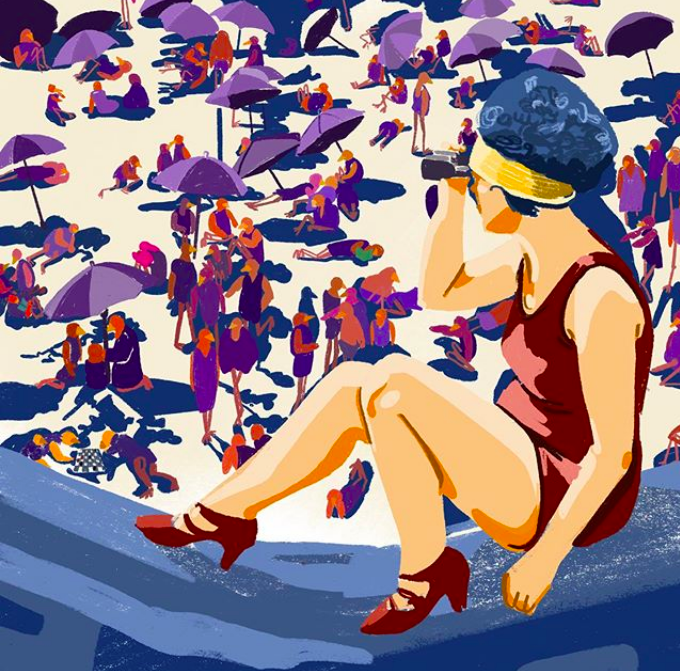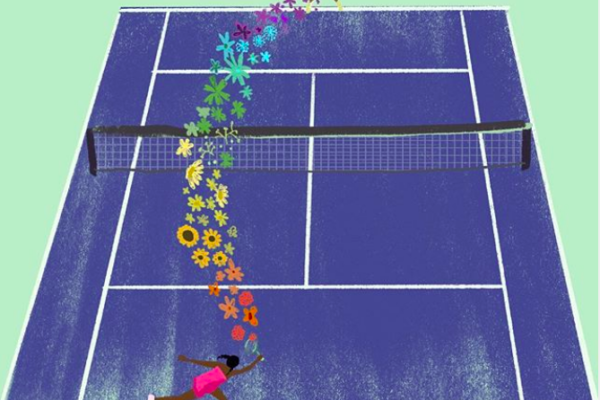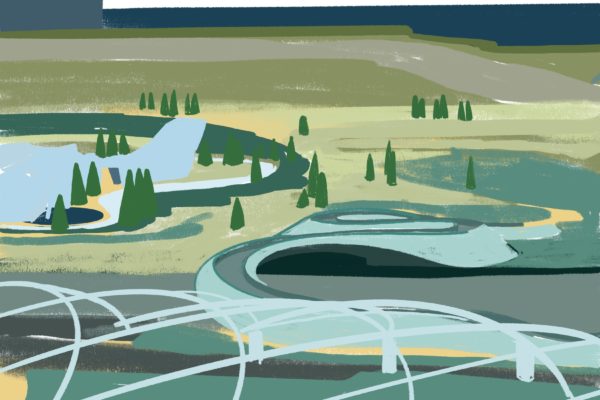In Chicago, May is the season for birds. Since our great city is on the lip of Lake Michigan, tens of thousands of migratory birds stop here on the way to their summer homes, and spending time watching them can be tremendously rewarding.
All three of us at The Office of Modern Composition are enthusiastic novice bird-watchers. In the past, we have gone on an annual writer’s walk at The Magic Hedge in Chicago in early May to count birds and be quiet together. This year, such a walk was impossible — but we all looked at birds on our own anyway, and then came together once a week to discuss our findings.
Here are three essays we’ve come up with this year that connect birding to writing. We are also interested in whatever writing you might be doing about birds or that is bird-adjacent. Send us your own bird essays (email jill@officeofmoderncomposition.com)! We’ll publish the ones we love.
Is This Bird-watching Or Is This Writing?
by Jill Riddell
The settings where birding and writing take place are different from one another. External details are different, but inner emotions and various milestones are similar.
Stage 1. Thrilled, Enthusiastic
Whether invigorated by an inspiring idea to write about or convinced that today is a good day to bird, I begin with outrageous optimism.
Stage 2. Committed, Diligent
I follow through. I sit down somewhere to write, or I successfully wake up at five to go to my favorite spot to look for birds before I go to work. Nothing deters me. I am determined.
Stage 3. Doubt
Uncertainty creeps in.
Is this idea as special as I thought it was?
The woods are awfully quiet. I don’t see any birds.
Stage 4. Despair, Self-Pity
The word “catastrophize” perfectly encapsulates the inner monologue at stage four. Not only was the initial idea for the piece I’m writing stupid, but pretty much all my ideas are. Not only are there no birds in these particular woods at this moment, but I’m bad at observation, I’m not patient enough, not expert enough. A competent writer would be able write this piece much more easily. A good birder would be able to find birds.
Stage 4 used to linger because as much as I hated it, there was also something about it that was mesmerizing. Once the idea that I was idiotic for attempting what I was doing took hold, that idea sounded so much wiser than Stage 1 with its childish enthusiasm.
I will say, though, that one advantage of growing older is that this phase is briefer than it used to be. Its uselessness has been proven over and over again.
Yet it seems to be a step I cannot skip entirely.
Stage 5. Cautious Hope (“Maybe there IS something there”)
Something moves. From far away, I detect the shape of a distant warbler and its familiar flight pattern. In writing, the parallel for this is a decent sentence. It’s subtle, this change. A roseate spoonbill doesn’t fly into the oak in front me, and I don’t suddenly write a line like Shakespeare’s. It’s not a miracle sent down on a moonbeam. The sentence arises from who I am and the ecosystem I inhabit.
But it’s enough. Despair shifts gently to one side, off center stage, though never quite exiting. (“I’m here if you need me,” it says in a sexy whisper, handing me its card. “Just call.”)
Stage 6. Returning to Work
In birding, I raise my binoculars for a closer examination of that shape I saw. I study it, track it, and either it turns out to actually be an interesting bird or it doesn’t, but regardless, I now feel new hope. Once I’ve seen one thing moving, I detect others. There’s life here. I could’ve stopped at Stage 4 and decided this was a hopeless waste of time, but I didn’t, and now I’m discovering that secretly the trees are alive with birds. A few are species of flycatchers, which I can’t really discern the difference between, to be honest; but some of the birds are stunners with bright plumage and fancy stripes. Over a period of an hour, some I identify and some I can’t but I enjoy trying. Not in the thrilled manner of Stage 1—but in the way of quiet competence.
In writing, this is when I start going at a good clip. That first decent sentence is followed by another and the work no longer feels laborious. In my head now I’m thinking neither “I suck at this,” nor, “I’m good at this.” I’m just a writer writing. I’m like a cook cooking or a knitter knitting or a potter making a type of vessel that she’s made before. The cool thing about it, though, is that this piece of writing or this bird excursion, like all handmade things, demands some element of improvisation and its end result will vary.
Stage 7. Pause
In either writing or birding, there’s no well-marked and completely agreed-upon finish line. I stop in an arbitrary spot. Whatever was accomplished is enough for now. The experience was full enough, though, that now I know I can trust myself to continue with this quest. For both writing and birding, the pursuit is lifelong. I know I’ll go back to the page to look at those words. I’ll know I’ll go back to watch birds.
The Birder’s Dilemma
by Raghav Rao
In September 2018, I began a quest to see 100 hundred American birds. To date, T and I have seen 122.
Whenever I attack a list, or begin the act of collecting, I remember this paraphrased quote: “A collector acquiring the item that completes his collection signifies his own death.” As I’ve said countless times to anyone who will listen, there is one excellent reason for ignoring this sentiment: it was made, pompously no doubt, by a French philosopher. And let’s be honest: they never say anything useful.
Of course, having hit 100, wordlessly, our goal crept up to … what, exactly? We’re not sure. But here’s a quote from a much more practical Englishman: “Ah, but man’s reach should exceed his grasp / or what’s a heaven for.”
To those who are judging us, who may be saying, “Counting! How uncouth. Why don’t you just enjoy the present? Enjoy the sunshine, nature, air … all that stuff?” Part of me wants to say, “We are, goddamnit! No need for mutual exclusivity.”
But we live in a counting culture, a goal-centered culture. And that resides deep inside us. (Well, inside me, at least.) The shame of not living in the present engenders a new quest: abandoning all quests. And if that’s a paradox, then it’s clear what the real quest is: to live in the paradox.
You may be asking how this is analogous to writing. And I could answer something about word counts or pages per day. But I really believe that fundamentally, flow and joy are connected somehow to the idea of abandoning objectives and embracing the here and now. But even phrasing it that way converts achieving flow and joy into another kind of objective.
With birding and writing, to paraphrase the Zen monks, if you think too much, you’re effed.
Turn Around And Go The Other Way
by Sophie Lucido Johnson
The mayor of Chicago has closed the lakefront.
She’s done this because there is a global pandemic, and people can’t be trusted on beaches to stay calm or six feet apart. And in the grand scheme of things, giving up the lakefront for one summer is a small sacrifice. It is not as though we’ve been asked to give up shoes, or calling our family members on their birthdays, or ordering tacos.
But on the other hand, Chicago’s Montrose Point Bird Sanctuary (otherwise known, wonderfully, accurately, as The Magic Hedge) is maybe the number one best thing about the city — hot dogs and skyscrapers be damned. Especially in May, when the migratory songbirds hang out there on their way northward, the little plot of protected land feels dreamlike. How can there be so many rare birds in such a small space?
My husband and I both have birthdays in May, and always celebrate at the Magic Hedge. There were times early on, when we lived closer, that we went there every day. But this year, there could be no such outings. I imagined the birds coming in for their annual spring fling, flitting around all, “Where are all the people? Usually there are people here. Why have all the people disappeared? Is it something about the weather?” Because surely birds watch us, too. We can’t be so arrogant as to think that it’s a one-sided practice.
This year, The Magic Hedge, which had always been fantastical and difficult to write about, became a fiction. I spent time walking along the non-lake-adjacent sidewalks in my neighborhood making up whole stories with interwoven plot lines about what was going on at Montrose this May. Maybe the birds took advantage. Maybe they were luxuriating on the paths where binoculars-laden humans normally perched. Maybe all avian inhibitions had been abandoned, and the birds were having epic Shakespearian dramas. There was no way to know!
Over time, not knowing became delightful. I let myself daydream into the realms of the impossible. Owls befriending indigo buntings. Terns learning to sing like mourning doves. Who was going to stop me?
And meanwhile, new bird-watching spaces unfolded. They’d always been there, but they were easy to ignore when Montrose was available, perfect and total as it was. One afternoon my husband and I found four species of warbler at one time in the tree outside our house. (There were also orioles and grosbeaks, and my roommate saw a scarlet tanager.)
Every Saturday all spring we went to a new forest preserve. Once we came upon twenty gargantuan herons’ nests in the trees, each with a stalky bird standing keeping watch. Once we found a great horned owl teaching her two owlets how to fly. We’d never have seen any of this had The Magic Hedge been open.
Restraint can be a gift. There are always many paths to choose; the mistake would be to stop walking altogether. And not to be too cliche, but so it is in writing. When you hit a dead end, consider the possibility that it isn’t a dead end at all. Turn around and go the other direction. Who knows what else there might be.




No Comments